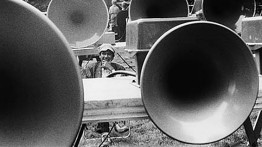Alvin Curran: Music Outside the Concert Halls
Tuesday, October 7, 2014, 7 - 8:30pm

Alvin Curran. Photo by Hannah Frenze
In a free, public lecture, composer Alvin Curran will present an overview of his large-scale ambient sound-installations with an emphasis on the visual and dynamic elements that have now become common practice in the area of Sound Art.
Democratic, irreverent and traditionally experimental, Curran travels in a computerized covered wagon between the Golden Gate and the Tiber River, and makes music for every occasion with any sounding phenomena -- a volatile mix of lyricism and chaos, structure and indeterminacy, fog horns, fiddles and fiddle heads. He is dedicated to the restoration of dignity to the profession of making non-commercial music as part of a personal search for future social, political and spiritual forms.
Curran’s music-making embraces all the contradictions (composed/improvised, tonal/atonal, maximal/minimal...) in a serene dialectical encounter. His more than 150 works feature taped/sampled natural sounds, piano, synthesizers, computers, violin, percussion, shofar, ship horns, accordion and chorus. Whether in the intimate form of his well-known solo performances, or pure chamber music, experimental radio works or large-scale site-specific sound environments and installations, all forge a very personal language from all the languages through dedicated research and recombinant invention.
Alvin Curran appears as part of the Interdisciplinary Seminar, created as a discussion series on artistic practice for the students of the Cooper Union School of Art and the creative community that surrounds them. Lectures are free and open to the public.
Located in the Frederick P. Rose Auditorium, at 41 Cooper Square (on Third Avenue between 6th and 7th Streets)




